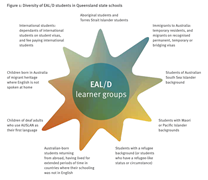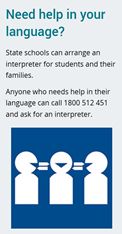English as an additional language or dialect (EAL/D) students are those whose first language is a language or dialect other than English and who may require additional support to assist them to develop proficiency in Standard Australian English (SAE).
EAL/D learners can include those born in Australia and raised in families in which languages or dialects other than English are spoken such as Aboriginal and Torres Strait Islander students or children of migrants. Those born outside of Australia include humanitarian entrants, international students and migrants.
Teachers determine students' English language proficiency (listening, speaking, reading and writing) using Bandscales State Schools (Queensland). Teachers may have EAL/D students in their classrooms from a diverse range of cultural backgrounds and with varying levels of proficiency in SAE.

© State of Queensland (Department of Education) 2018
Assessment and Reporting
Depending on the student's levels of English proficiency, the language demands of the task may be reduced, allowing students to focus on demonstrating their content understanding.
Students are assessed and reported against the achievement standard for the year level curriculum they are taught however EAL/D students in their first 12 months of Australian schooling may be exempt from this. For these students, their reports contain a written statement about their English language proficiency against the Bandscales State Schools (Queensland) as well as achievement in the learning areas of the Australian Curriculum if appropriate.
Supporting your EAL/D child
Parents play a very important role in supporting student learning. For advice on how you can help your child to learn English click here
Engaging Interpreters and Translators
To engage with an interpreter to support communication at school – visit:
https://education.qld.gov.au/students/inclusive-education/interpreters-in-schools

For more information about English language support in Queensland state schools visit: https://education.qld.gov.au/students/inclusive-education/english-language-support